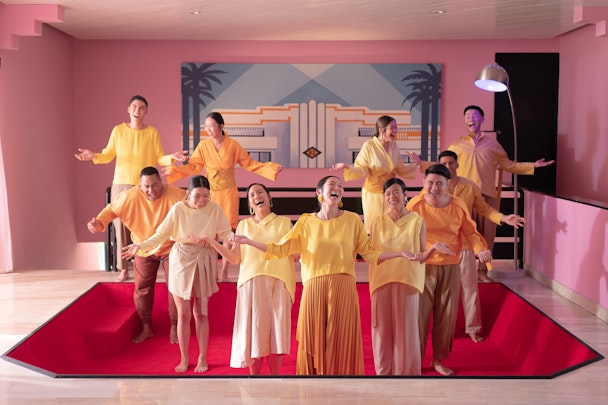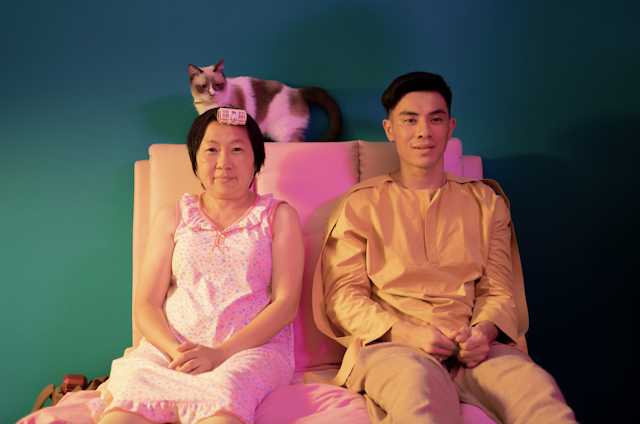Superson’s Antti Toivonen on writing and producing a feature film on the side
Despite launching in a challenging year for cinema, the Singapore cinematic hit of the year Tiong Bahru Social Club has triumphed, and it was co-written and produced by a creative agency leader, somewhat in his spare time.

Superson’s Antti Tiovonen on writing and producing a feature film on the side
Superson’s APAC managing partner and creative director Antti Toivonen lives a double life as a writer and producer of feature films but Tiong Bahru Social Club has been his most ambitious film to date. The gentle, highly colourful comedy takes on some serious topics, such as big data and the future of happiness in communities.
The film debuted at festivals this year, challenged by the remote and digital screenings, but saw success and is now across cinemas in Singapore.
The Drum spoke to Toivonen about the themes of the film and how he managed to take on such a huge creative endeavour, all while building an agency in Singapore.
Tell me about the film – what’s it about and how did it come to fruition?
Tiong Bahru Social Club is a retro futuristic comedy about a real estate company trying to create the happiest neighbourhood in the world. It’s an idea our director Bee Thiam Tan, producer Junxiang Huang and I toyed around with for a long time. Tiong Bahru is Singapore's oldest 'modern' neighbourhood, known for its futuristic art deco architecture and village-like feel. Back in the day it was a very bold vision about the future of living. As we know, the future didn't end up looking like Tiong Bahru so we envisioned what this alternative future could have been. But essentially, we just wanted to make a movie unlike anything that has come from Singapore before; having a Singaporean–Finnish creative team brought together two very different sensibilities, which hopefully shows. And me coming from Finland, the happiest country in the world, inspired the team to explore the idea of measuring happiness.
How do you balance the day job and the passion work?
I get this question a lot but I don't draw a big distinction between the two. 95% of my time is spent on Superson and our client projects; movie projects move so slowly that having all these things live side by side is not too challenging, they are just projects amongst others. I'm at heart a creative guy who likes to build things that make people tick. Building Superson is equally a passion project for me as well.

Do the two types of creative work influence one another?
Yes, there's a lot of cross-pollination between the two. Eventually, in advertising, we want to create something that really speaks to people. To me projects that purely aim at striking a chord with the audience are super important; it keeps you on the pulse of the culture and acts as a reminder that audiences are not easy to entertain; our messages are competing with games and the latest Netflix shows and it's a harsh environment. There is a reason why film festivals see very little branded content short films; The standard of storytelling is not there, despite all the industry talk about it. The influence works the other way round too. Advertising backgrounds can help anyone conceptualise clear and exciting 'audience-first' ideas and stories, and eventually to package them too. It also gives an advantage in the commercial aspect of the thinking process. So these two types of creative work complement each other a lot. In the end, it's all about building imaginary worlds for the people.
What would be your advice for people in the industry that have creative ideas that sit outside the day job?
Go for it. Passion projects are extremely important for your professional growth, even if they feel unlinked at first. They will send you on a very interesting path and they build your entrepreneurial muscle. The whole idea of Superson's freelance-based specialist model is to be able to work with people with strong passions and expertise that comes from those passions. To me, passion is key to being great at what you do. I always tell young creatives not to compromise their passion projects even if it feels compelling and necessary to focus on agency briefs to 'establish yourself'. What stems from your passion projects is what truly defines you as a creative in the long run.

How do you create a film that’s uniquely Singaporean but also appeals to a wider, international audience?
Funnily enough, Bee Thiam and I started the creative process by tapping into insights about urban communities and millennial woes, both in Singapore but also around the world. So in advertising terms, we did a fair bit of strategy work before we settled on our ideas. The film touches on themes such as people’s longing for a warm, communal neighbourhood, liveability of cities, the pressures of finding purpose in your life when you’re about to turn 30 and the changing faces of cities through gentrification.
Tiong Bahru Social Club has lots of elements that make it uniquely Singaporean, for example, the mishmash of languages we use; Mandarin, English, Malay, Tamil, Cantonese, Hokkien. I don’t think we could have pulled off something like that anywhere else. Here it mirrors the reality. The way we depict Singapore is a fantastical, yet relatable take on life here.
Happiness and data, however, are universal themes. And there is a neighbourhood like Tiong Bahru in every metropolitan city; in Melbourne it would have been Fitzroy, in Helsinki it would have been Kallio or Käpylä, and so forth. In the end, we aimed at creating something that feels familiar yet exciting.
The scripting taps into a few big themes, such as data and happiness – what do these themes mean to you and why did you use them for the story?
Data is a super interesting theme as that’s something we talk about in the marketing industry a lot; targeting, customised messaging, metrics. When used right, it’s very powerful. However, we also need to recognise the limits of the capabilities of the current technology. There’s a lot of talk about how social media giants and credit card companies know everything about us. But still, after over a decade of exposing myself to various social media platforms, I get bombarded by ads that anyone who actually knows anything about me, would never show to me. So it’s a story about blindly relying on things we can measure and not paying attention to what we see and feel around us.
As a creative, I’m always interested in the balance of what we can measure and when do we need to trust that famous gut. Until data can tell us what genuinely gets people excited, how to crack a joke and what will blow everyone’s socks off and make people go ‘hell yeah’, we need a combination of hard facts and belief, auteur-like point of view. I’m saying this because I’ve seen people getting lost in data so many times. It’s like driving a car looking at the speed meter and not paying attention to the road ahead. Humanity is hard to quantify, but we have spent all our lives dealing with the real world; we should be experts on people by definition. I love data and all its possibilities, yet I strongly believe there’s a value to your gut when creating cultural products.
Happiness was chosen as a theme because I come originally from Finland, the happiest country in the world. Bee Thiam Tan and Junxiang found the attempts to define and measure happiness very interesting. And every time the results are announced, Finns react with disbelief and almost get offended, claiming that they are not happy. Yet on some scale, it can be argued that they are.

And the look of the film, while tackling an almost sci-fi topic, is very human and colourful, was that something you had hoped for the script?
Yes, absolutely. We worked on the script together with James Page’s art team to make sure that the colourful visual world and the story come together nicely. We wanted Tiong Bahru to feel like entering a bubble tea factory. We changed the script based on what they can build. I’m a big believer in organic and collaborative processes, so are Bee Thiam and Junxiang. So we wrote with the art team and also the actors. Besides, you can achieve so much by putting effort on the art direction of each frame, it was an eye-opener even for me. I wasn't used to such attention to detail even though I've worked in advertising all my career. But the result can be seen on the screen too!
Also, we didn’t want to make yet another episode of Black Mirror. Themes like big data get dystopian echoes very easily. To us, it is a tiring argument. We didn’t want to create an evil corporation, but more like a story about our human struggles in understanding and harnessing data.
Tiong Bahru Social Club doesn’t take sides, there are only pure intentions in that world.

